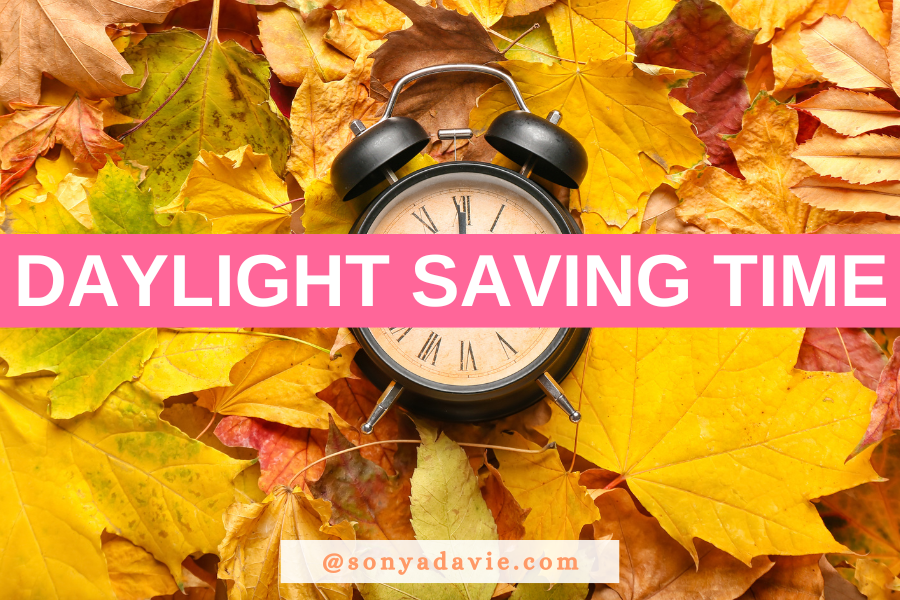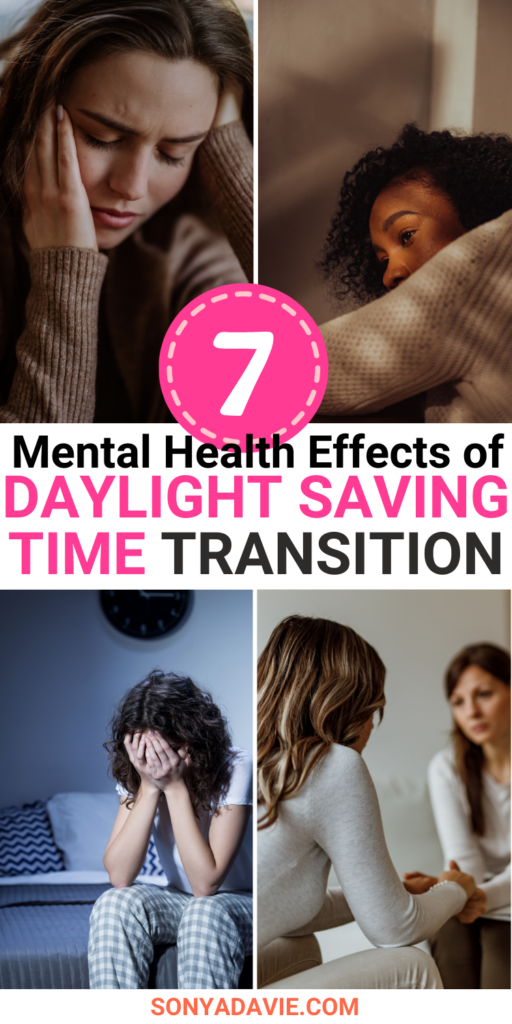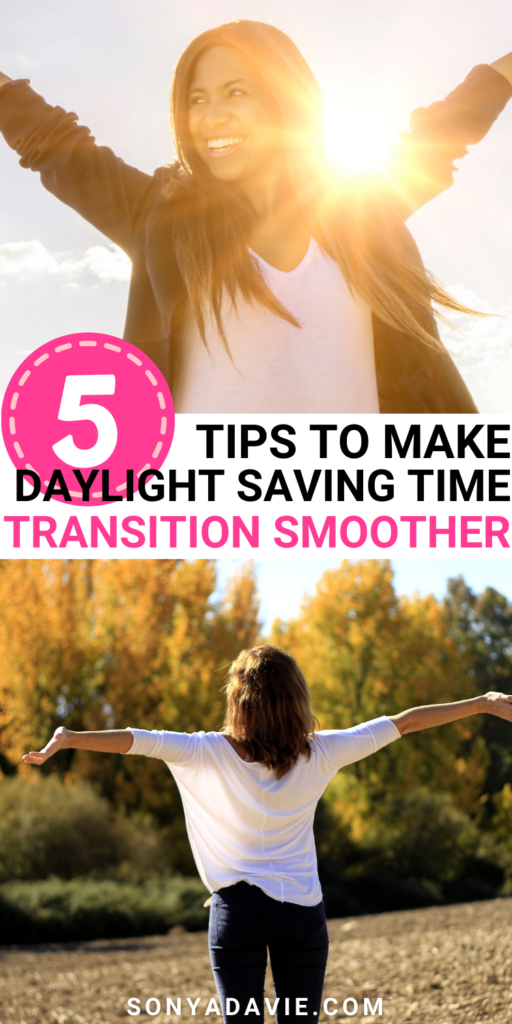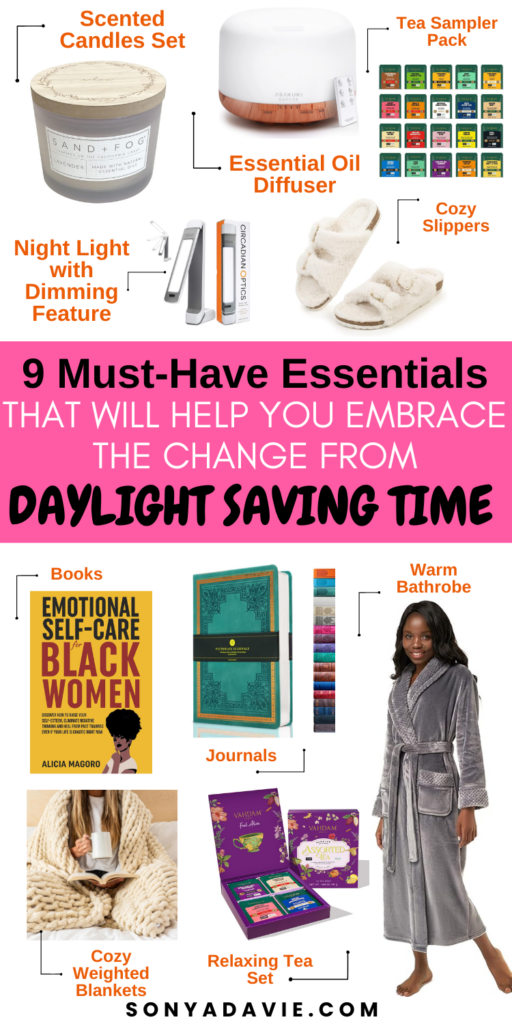Ever notice how your mood takes a dip or your sleep schedule gets all messed up when it’s time to change the clocks?
If you’re like most folks, the switch out of Daylight Saving Time can leave you feeling groggy, irritable, and a bit down. And – You’re definitely not alone in this!
Picture this: you’ve finally gotten used to waking up to that lovely morning sunlight, and then—bam!—the clock springs forward or falls back, and your routine is all out of whack.

This post is all about daylight savings time and mental health.
For some, it can be more than just an inconvenience. Losing or gaining an hour may lead to increased anxiety, sleep issues, and even seasonal depression.
Let’s dive into how this time shift affects you and what you can do about it.
What is Daylight Savings Time?
Daylight Saving Time (DST) is the practice of moving the clock forward by one hour during the warmer months to extend evening daylight. The goal is to make better use of daylight and conserve energy. In the spring, clocks are set forward by one hour (often referred to as “springing forward”), while in the fall, they are set back by one hour (“falling back”).

When Does the Time Change?
- Spring Forward: In the United States, Daylight Saving Time typically begins on the second Sunday in March. Clocks are set forward by one hour at 2:00 AM.
- Fall Back: It ends on the first Sunday in November, when clocks are set back by one hour at 2:00 AM.
Note: Not all regions or countries observe DST, and some places have opted out of the practice.
As DST ends in early November, the clocks are set back one hour, and we transition into shorter days and longer nights.
While this practice may have once been useful for conserving energy and benefiting agricultural schedules…
research has linked the transition into and out of DST to unintended consequences on our mental health, especially as we head into the darker, colder months of the year.
Let’s explore more on what this transition does to our well-being and some helpful tips to cope with it.
7 Ways Daylight Saving Time Transition Affects Your Mental Health
1. Sleep Disturbances
One of the most common effects of daylight savings time on health is sleep disruption. The time change can throw off your body’s internal clock, or circadian rhythm, leading to difficulty falling asleep or staying asleep. This can result in increased fatigue and brain fog throughout the day.
2. Anxiety and Stress
The disruption to sleep patterns can also lead to increased levels of anxiety and stress. For those already prone to anxiety, the shift can heighten these feelings, making it difficult to maintain a calm and steady mood.
3. Exacerbation of Seasonal Depression (SAD)
The effects can be particularly harsh for individuals who suffer from Seasonal Affective Disorder (SAD). The end of DST means shorter days and less sunlight, which can worsen symptoms of depression. Less sunlight exposure affects serotonin levels, a hormone that contributes to feelings of happiness and well-being. This connection between daylight savings and depression highlights how even a one-hour shift can have a domino effect on mood.

4. Mood Swings and Irritability
Adjusting to a new sleep schedule, coupled with less daylight, can lead to irritability and mood swings. This shift can make it harder for people to manage their emotions, leading to stress in everyday interactions.
5. Lower Energy Levels
The body thrives on routine, and when that routine is disrupted, it can result in low energy levels. Many people find themselves feeling more tired during the day after the clock changes, as their bodies try to catch up to the new rhythm.
6. Difficulty Concentrating
Reduced sleep quality and increased fatigue often lead to problems with focus and concentration. Many people find it harder to stay on task and make decisions during the period of transition into or out of DST.
7. Changes in Eating Patterns
The shift in time can also affect your eating schedule. Some may find themselves feeling hungrier at odd hours, while others might skip meals altogether because their appetite isn’t in sync with the new time. This change can impact overall health and well-being.
5 Daylight Savings Time (DST) Tips
To make the transition smoother, here are some daylight savings time tips:
1. Gradual Adjustment
Start adjusting your sleep schedule a few days before the time change. Go to bed 15 minutes earlier or later (depending on the direction of the shift) each night leading up to DST to help your body adapt.

2. Sunlight Exposure
Get outside and soak up some natural light, especially in the morning. Daylight exposure helps regulate your circadian rhythm and can make the transition less jarring.
3. Create a Relaxing Bedtime Routine
Establish a consistent pre-sleep routine that calms your body and mind. Consider reading, meditating, or taking a warm bath before bed.
Related Post – The Power of Self-Care: Why It Matters and How to Start Today
4. Limit Caffeine and Alcohol
Reduce caffeine and alcohol intake, especially in the evening, as both can interfere with your sleep cycle during the adjustment period.
5. Exercise Regularly
Physical activity can help improve sleep quality and stabilize your mood. Just make sure to avoid vigorous exercise close to bedtime.
9 Must-Have Essentials to Help You During the Transition
Sometimes, a few comforting items can make a huge difference.
Here are nine of my personal favorites that can help ease the transition, making those longer nights cozier, more comforting, and beneficial for your overall well-being.

1. Scented Candles Set
A variety pack of scented candles in calming fragrances like lavender and vanilla, perfect for creating a cozy atmosphere.
2. Essential Oil Diffuser
A stylish diffuser that can help set the mood with your favorite essential oils, promoting relaxation during the time change.
3. Coffee or Tea Sampler Pack
A selection of gourmet coffee or tea options to savor as you adjust to the new time.
4. Night Light with Dimming Feature
A soothing night light that can help ease the transition into darker evenings.
5. Cozy Slippers
Comfortable slippers to keep your feet warm and relaxed as the weather cools down.
6. Books or Journals
A couple of good reads or a cozy journal to curl up with and enjoy during the longer evenings.
7. Warm Bathrobe
A soft bathrobe to wrap yourself in for extra warmth and comfort during chilly evenings.
8. Weighted Blanets
Using a weighted blanket can create a sense of security, similar to a hug, which can be especially beneficial during the transition out of Daylight Savings Time.
9. Herbal Tea Relaxation Set
A selection of herbal teas designed to promote relaxation, ideal for winding down after a busy day.
These essentials can help you embrace the transition out of Daylight Savings Time, offering warmth, comfort, and ease during the change.
The effects of daylight savings time on mental health shouldn’t be underestimated. While the time change may seem minor, it can have a ripple effect on your sleep, mood, and overall well-being.
By understanding how these changes impact you and taking steps to minimize the disruption, you can manage the shift with greater ease.
Remember, it’s all about making small adjustments, finding comfort in routine, and creating a supportive environment as your body adapts.
This post is all about daylight savings time and mental health.
+ show Comments
- Hide Comments
add a comment